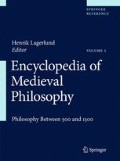Abstract
In Islam, the revealed text reminds human beings of their need to know (Qurʾān, XVI, 78). Muslims embarked on an intellectual task, which was expressed in different discourses: theology, jurisprudence, mysticism, linguistics, history, and philosophy. The latter took shape when Islamic thought came into contact with Greek philosophy, giving rise to a movement called falsafa: philosophy. This movement continued and recreated Greek philosophical thought in the Islamic world. The great issues that interested philosophers were the relationship between philosophy and religion, the explanation for and conception of the universe and its origin, and human beings and their social and political conduct. Falsafa enjoyed productive expansion and diffusion throughout the Islamic world, first in the East and later in the West, where it exerted a powerful influence on the thought of Latinized areas: it contributed to the transmission of Greek philosophy to Europe and to new developments in the medieval philosophy of the Latin world.
Bibliography
Primary Sources
Avempace (1997) El régimen del solitario trans: Lomba Fuentes J. Editorial Trotta, Madrid
Avempace (2006) Carta del Adiós (Risālat al-wadā’) y otros tratados filosóficos trans and notes: Lomba J. Editorial Trotta, Madrid
Averroes (2001a) The book of the decisive treatise determining the connection between the law and wisdom & epistle dedicatory. Trans with intro and notes: Butterworth CE. Islamic translation series. Brigham Young University Press, Provo (with Arabic facing)
Averroes (2001b) La Béatitude de l’âme. Latin edn, annot, trans: Geoffroy M, Steel C (Sic et Non). Vrin, Paris
Averroes (2005) Averroes On Plato’s Republic. Trans: Lerner R. Cornell University Press, Ithaca
Avicenna (1978–1985) La Métaphysique du Shifā’, 2 vols. Trans, intro, and notes: Anawati GC. Vrin, Paris
Avicenna (1999) Le Livre des directives et remarques (Kitāb al-ishārāt wa-l-tanbīhāt) trans: Goichon A-M. Vrin, Paris (reprint of 1951 edn)
Avicenna (2002) Metafisica. La Scienza delle cose divine (al-Ilahiyyat) dal Libro Della guarigione (Kitāb al-Shifā’), a cura di Lizzini O, Porro P. Bompiani, Milan
Avicenna (2008) Libro della guarigione. Le cose divine, a curadi Bertolacci A. UTET, Torino
al-Fārābī (1999) L’Harmonie entre les opinions de Platon et d’Aristote Arabic ed. Najjar F, trans and notes: Mallet D. Institut Français de Damas, Damascus
al-Fārābī (2001) The political writings: Selected Aphorisms and other texts trans and annot: Butterworth CE. Cornell University Press, Ithaca/London
al-Fārābī (2001a) L’Épitre sur l’intellect (al-Risāla fīl-ʿaql) trans: Hamzah D, foreword: Jolivet J, postword: Brague R. L’Harmattan, Paris; Ramón Guerrero R (2002) Al-Farabi: Epístola sobre los sentidos del término intelecto. Traducción. Revista Española de Filosofía Medieval 9:215–223
al-Fārābī (2001b) Philosophy of Plato and Aristotle, rev edn (trans with an intro: Mahdi M, foreword: Butterworth CE, Pangle TL). Cornell University Press, Ithaca
al-Fārābī (2002) El camino de la felicidad (Kitāb al-tanbīh ‘alà sabīl al-sa‘āda) traducción, introducción y notas Ramón Guerrero R. Editorial Trotta, Madrid
al-Fārābī (2008) Al-Farabi: Obras filosóficas y políticas. Traducción, introducción y notas por Ramón Guerrero R. Editorial Trotta/Liberty Fund, Madrid
al-Kindī (1974) Al-Kindī’s Metaphysics. A translation of Ya‘qūb ibn Isḥāq al-Kindī’s treatise “On First Philosophy” (Fī l-Falsafah al-Ūlā) intro and comment: Ivry AL. State University of New York Press, Albany
Secondary Sources
Adamson P (ed) (2007) Classical Arabic philosophy: sources and reception. The Warburg Institute/Nino Aragno Editore, London/Turin
Adamson P, Taylor RC (eds) (2004) The Cambridge companion to Arabic philosophy. Cambridge University Press, Cambridge
Anawati G (1974) Études de philosophie musulmane. Vrin, Paris
Cruz Hernandez M (1996) Historia del pensamiento en el mundo Islámico, 3 vols. Alianza Universidad, Madrid
Daiber H (1999–2007) Bibliography of Islamic philosophy, vol I: Alphabetical list of publications; vol II: index of names, terms & topics. Brill, Leiden; Bibliography of Islamic philosophy. Supplement. Brill, Leiden/Boston
D’Ancona C (ed) (2005) Storia della filosofia nell’Islam medievale, 2 vols. Giulio Einaudi, Turin
Fakhry M (1983) A history of Islamic philosophy, 2nd edn. Columbia University Press, New York
McGinnis J, Reisman DC (2007) Classical Arabic philosophy: an anthology of sources. Hackett, Indianapolis/Cambridge
Ramón Guerrero R (2001) Filosofías árabe y judía. Síntesis, Madrid
Author information
Authors and Affiliations
Editor information
Editors and Affiliations
Rights and permissions
Copyright information
© 2011 Springer Science+Business Media B.V.
About this entry
Cite this entry
Ramón Guerrero, R. (2011). Philosophy, Arabic. In: Lagerlund, H. (eds) Encyclopedia of Medieval Philosophy. Springer, Dordrecht. https://doi.org/10.1007/978-1-4020-9729-4_398
Download citation
DOI: https://doi.org/10.1007/978-1-4020-9729-4_398
Publisher Name: Springer, Dordrecht
Print ISBN: 978-1-4020-9728-7
Online ISBN: 978-1-4020-9729-4
eBook Packages: Humanities, Social Sciences and Law

